Groundbreaking In-Office Blood Typing Products
RapidVet’s blood typing products bring the latest and best thinking to improve the quality of transfusion medicine – and preserve and improve the quality of life for your canine and feline patients.
We’re a trusted partner to thousands of veterinarians, emergency animal clinics, blood banks, and academic institutions worldwide who rely on our blood typing tests to help avoid potentially fatal transfusion mistakes. In fact, we’re the #1 provider of in-office blood typing products in North America– a testament to the quality of our products, backed by our exceptional customer service.
Explore our current product portfolio below to learn about our array of tests that use the proven blood typing technologies available today. Additional feline and canine typing products based on these and evolving testing methodologies are under development.
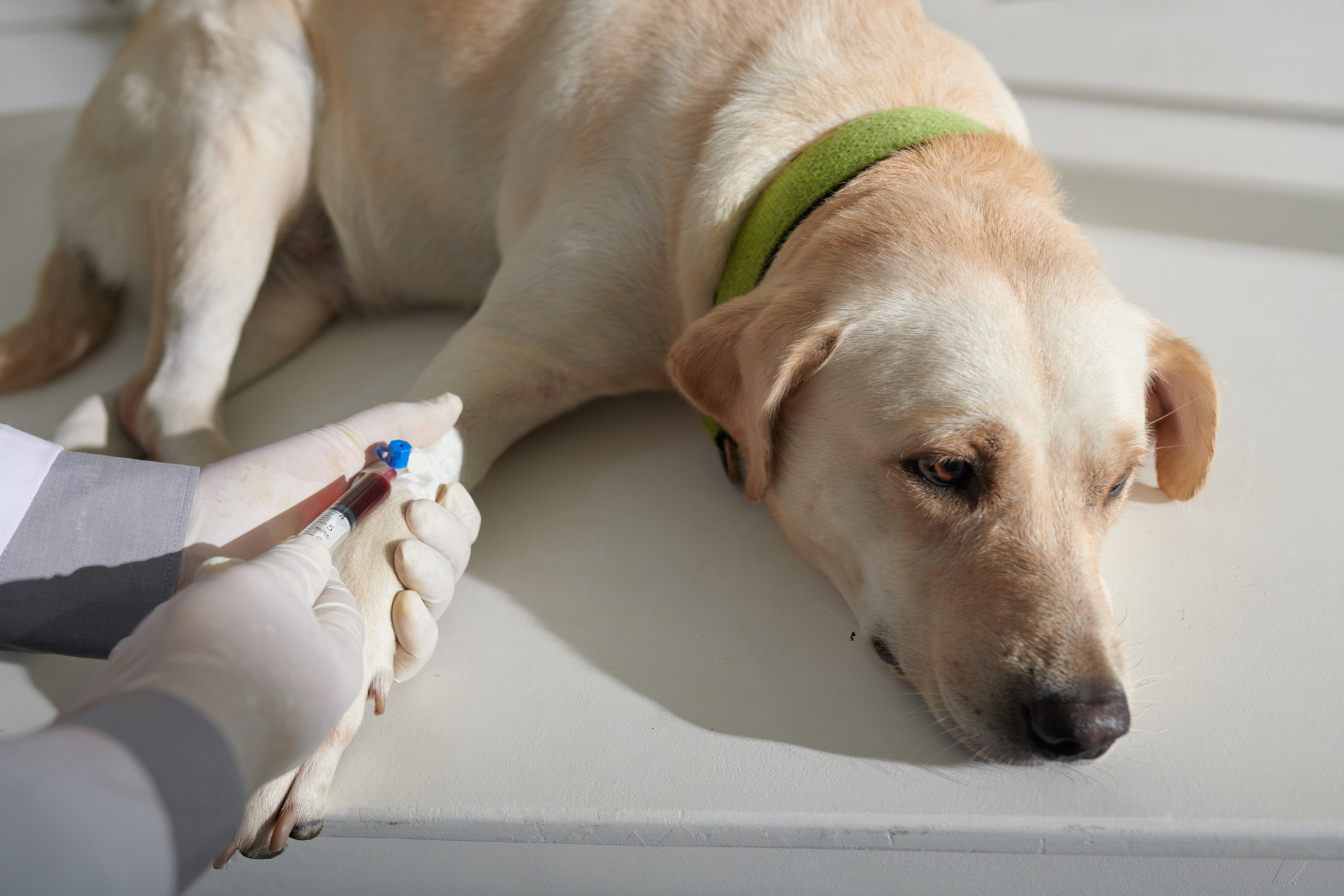
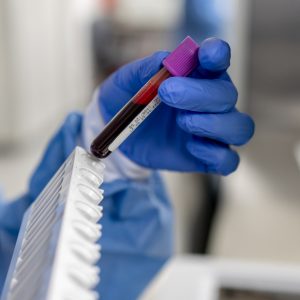
Dogs can have more than one blood type. And while it’s true that many dogs may tolerate an initial incompatible transfusion because most don’t have naturally occurring antibodies to incompatible blood groups, veterinary best practice – and your patients’ long-term health – dictates that such transfusions be avoided. That’s why RapidVet offers a selection of canine blood typing kits to ensure safe and effective transfusions.
All of our canine blood typing cards are:
- Easy to use: Typing cards have a freeze-dried reagent that’s reconstituted with a diluent before performing the test.
- Fast: The agglutination tests deliver results in 2 minutes or less.
- Cost Effective: Kits are available in varying sizes to suit your clinic’s needs. Discounts are available directly from RapidVet to educational institutions, blood banks, and recognized animal rescues/shelters.
- Easy to Store: Our typing cards can maintain a long shelf life. The typing cards remain usable for two years at room temperature storage.

RapidVet-H Canine Agglutination Test Cards for DEA 1
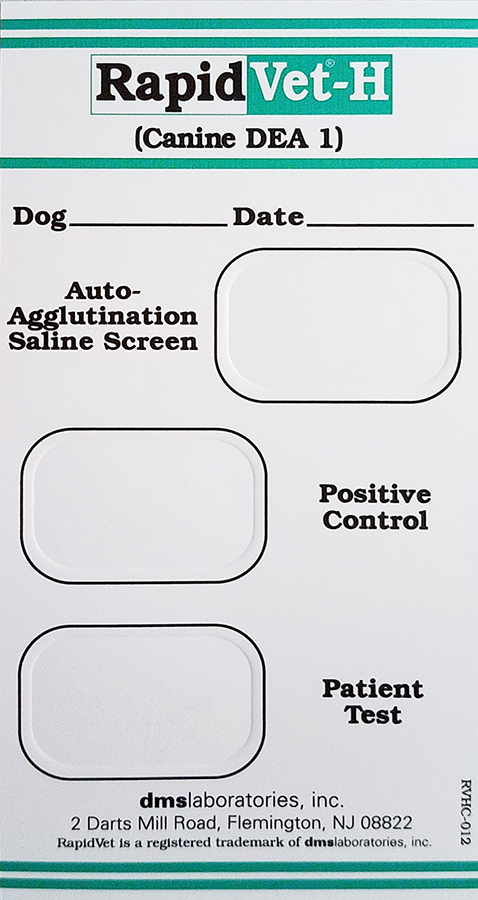
Although all dog erythrocyte antigen (DEA) blood types are capable of stimulating the formation of isoantibodies, DEA 1 is considered the most clinically important in causing an acute reaction from transfusion of incompatible blood. That’s because DEA 1 is thought to have the greatest stimulation potential and is considered the primary lytic factor in canine transfusion medicine. In fact, 40% of all dogs are estimated to be DEA 1-positive, and most reactions resulting from the transfusion of incompatible cells occur when blood identified as DEA 1-positive is given to a sensitized DEA 1-negative recipient.
Our canine agglutination test cards provide a fast, simple way to classify dogs as DEA 1-positive or -negative. Like our widely used feline agglutination test cards, these canine products are based on RapidVet’s pioneering point-of-care blood typing methodology.
RapidVet-H Canine Agglutination Test Cards for other Blood Types
Transfusion incompatibility can occur even between dogs that are DEA 1 compatible due to the presence of other blood group antigens in the donor or recipient. Testing for blood types other than DEA 1 provides vital information during pre-transfusion workup and donor selection. RapidVet offers the only in-office tests for canine DAL, DEA 4, and DEA 5.

Canine DAL
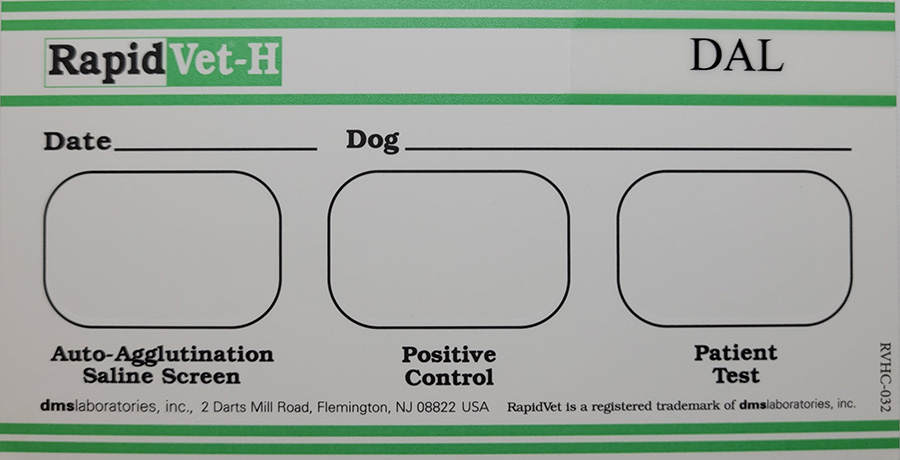
One of the blood types that can cause both acute and delayed hemolytic transfusion reactions is DAL. While most dogs are DAL-positive, the incidence of DAL varies greatly depending on the breed. Doberman Pinschers are especially at risk since the prevalence of both DAL-negative blood and von Willebrand disease is relatively high. Other breeds reported having a higher occurrence of DAL-negative blood include Dalmatian, Shih Tzu, Lhasa Apso, Bichon Frise, Cane Corso, Pug, Mastiff, and some mixed breeds. DAL typing is particularly important in those breeds and in patients with a history of transfusion, an undocumented history, and those needing multiple transfusions.

Canine DEA 4
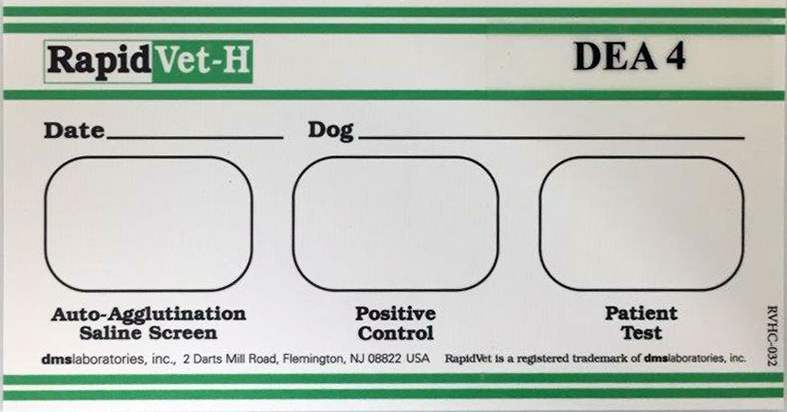
While rare, DEA 4 incompatibility does exist. DEA 4 is found to be present in 98% of dogs, and the formation of antibodies against it occurs in the rare instance when DEA 4-positive blood is given to a DEA 4-negative dog. This can have serious consequences in cases of subsequent transfusions, including acute hemolytic transfusion reactions from anti-DEA 4 alloantibodies in sensitized dogs. It has been reported that only 75% of Doberman Pinschers are DEA 4 positive, so typing for DEA 4 prior to transfusion may be of special importance in this breed. DEA 4 typing can help determine the possible cause of an incompatible crossmatch between dogs that are DEA 1-compatible.

Canine DEA 5
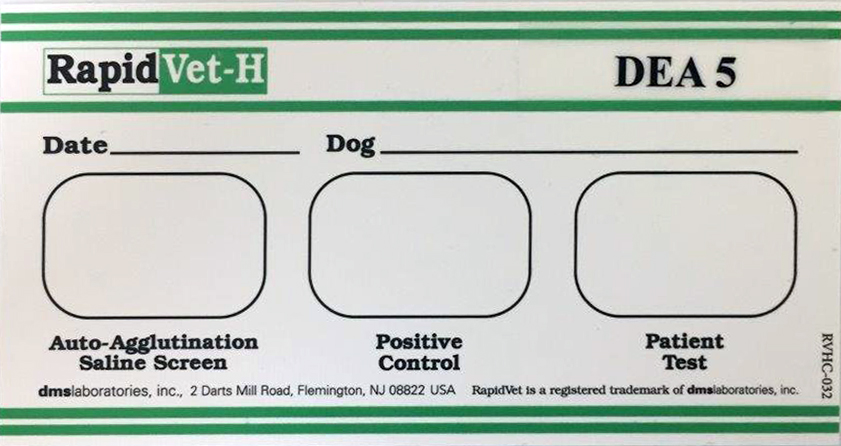
DEA 5 antigens are reported to occur on red blood cells in 10% to 25% of the canine population in the United States. In Greyhounds, the prevalence of DEA 5-positive blood has been reported to be as high as 30%. Although not all remaining DEA 5-negative dogs have detectable alloantibodies, an estimated 10% of those dogs have naturally occurring antibodies to DEA 5 antigens. These natural antibodies to DEA 5 antigen have not been reported to cause severe hemolytic reactions; however, incompatible DEA 5 blood is more rapidly hemolyzed within 4-5 days of transfusion and may result in a delayed reaction or contribute to a diminished response to treatment.

Veterinary science continues to learn more about feline blood types. Typically, four blood types are recognized and defined by the naturally occurring alloantibodies against the antigen they lack: Type A, Type B, Type AB, and MIK. However, there are several novel blood types under investigation.
The RapidVet feline blood typing products are used to classify cats as Type A, Type B, or Type AB.
RapidVet-H IC Feline Blood Typing Test
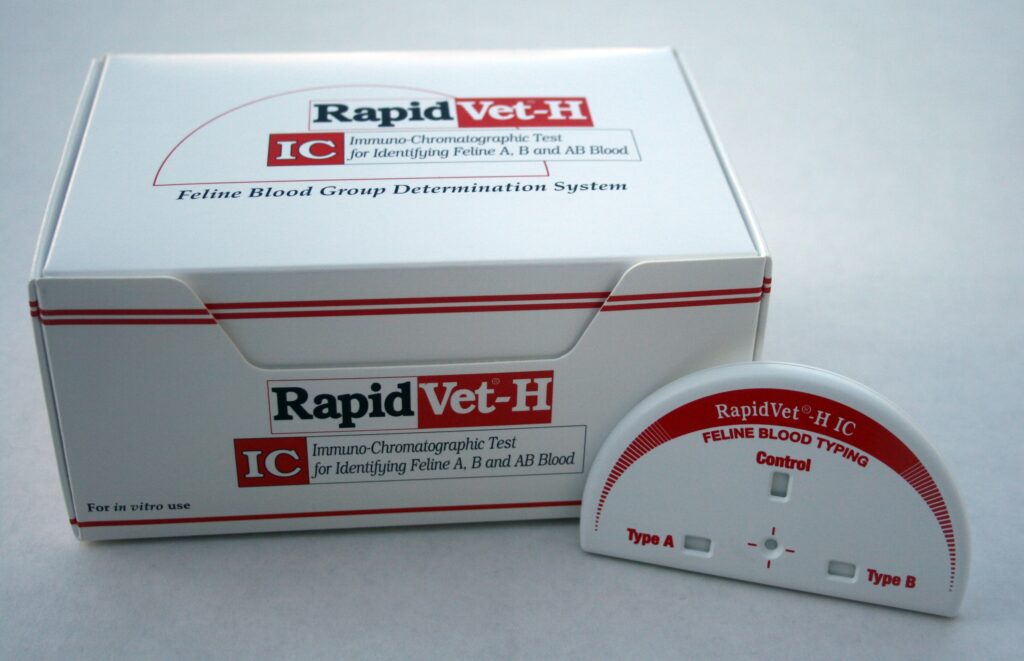
Developed through a joint venture, this innovative blood typing device uses lateral flow immunochromatographic (IC) technology to detect the presence of the target substance in a liquid sample (whole blood or packed red blood cells diluted with saline). A membrane/test strip incorporates monoclonal antibodies to detect the antigens that equate to an animal’s blood type.
- Economical: The simple, self-contained cartridge design eliminates the need for specialized and costly equipment, making it ideal for in-office testing.
- Fast: Results in 5 to 10 minutes, even in cases of auto-agglutination or low hematocrit.
- Accurate: Overall accuracy of 96.1%, with high sensitivity and specificity for A and B antigen detection.

RapidVet-H Gel Feline Blood Typing Test
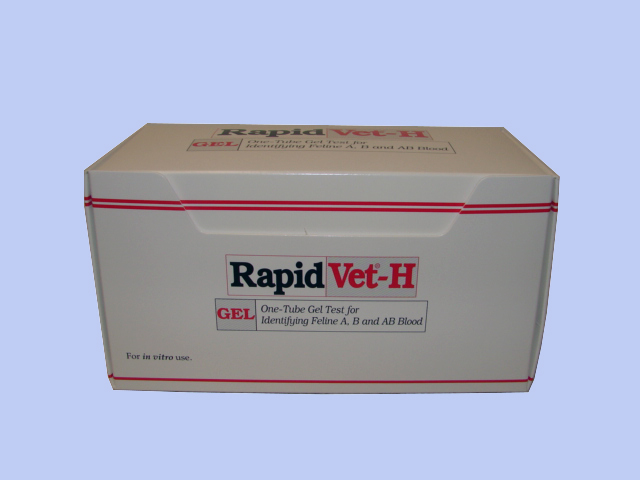
Gel technology is generally considered the gold standard in blood typing. All that’s required for our one-tube gel test for feline blood typing is a fixed-angle rotor centrifuge.
- Highly Accurate: This test has an overall accuracy of 98.3%, on par with the comparable gold standard test in human medicine.
RapidVet-H Feline Agglutination Test Card
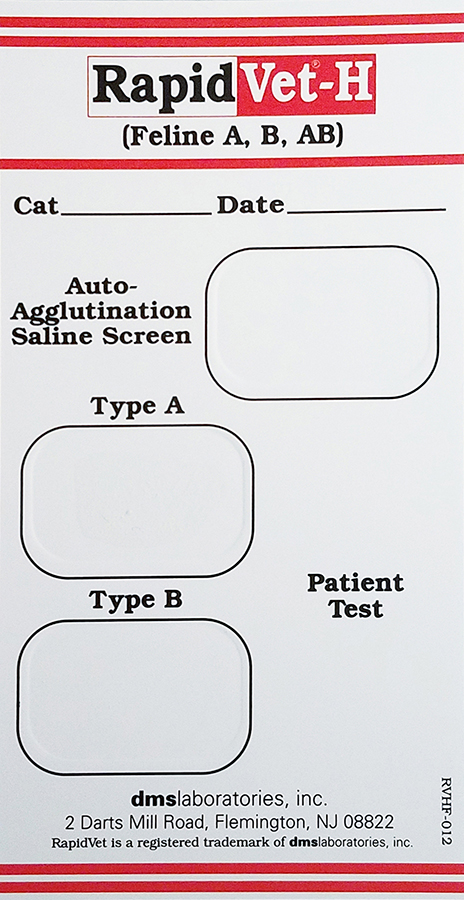

This is the industry’s original point-of-care blood typing methodology for felines, which RapidVet introduced in the mid-1990s. These tests remain widely used for their simplicity and speed in helping veterinarians avoid potentially fatal transfusion reactions. These tests are also valuable in making breeding decisions and understanding some medical problems in kittens.
- Easy to use: Typing cards have a freeze-dried reagent that’s reconstituted with a diluent before performing the test using a small sample of the patient’s blood.
- Fast: Our agglutination tests for blood type determination deliver results in 2 minutes or less.
- Cost Effective: Kits are available in varying sizes to suit your clinic’s needs. Discounts are available directly from RapidVet to educational institutions, blood banks, and recognized animal rescues/shelters.
- Long shelf life: The typing cards remain usable for two years at room temperature storage.
Contact Us
Learn More About Our Products
If you would like more information about our products or to place an order, please contact us today. Our team looks forward to serving you.
